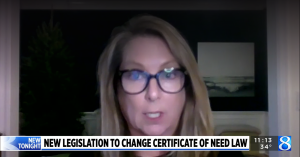

WOOD TV8 published a story Dec. 12 on the passage of Senate Bill (SB) 183, which includes language allowing rural emergency hospital (REH) licensure in Michigan. The bill passed Dec. 6 with overwhelming support in both the State House and Senate following collaboration between the MHA, the Michigan Department of Health and Human Services, the Michigan Department of Licensing and Regulatory Affairs and the Whitmer administration on making the necessary changes in state statute to allow for the new federal designation.
Laura Appel, executive vice president of government relations and public policy, MHA, spoke with WOOD TV8 on the bill and the challenges rural hospitals face which led to the creation of the federal REH designation. Appel discussed the high fixed costs associated with maintaining inpatient services and the financial reimbursement benefits offered to REHs.
“If your population goes down, your fixed costs don’t go down, but Medicare is going to continue to help you with those,” said Appel. “Regardless of where you are, if you’re a hospital in financial stress or if you’re a hospital that doesn’t want to become financially stressed … you have all of those things working in your favor.”
The MHA also received mentions in stories published Dec. 15, including one from Michigan Radio on the surge of respiratory illnesses being treated by Michigan’s pediatric hospitals and from Bridge on the increase of flu-related hospitalizations in the state.
Members with any questions regarding media requests should contact John Karasinski at the MHA.

